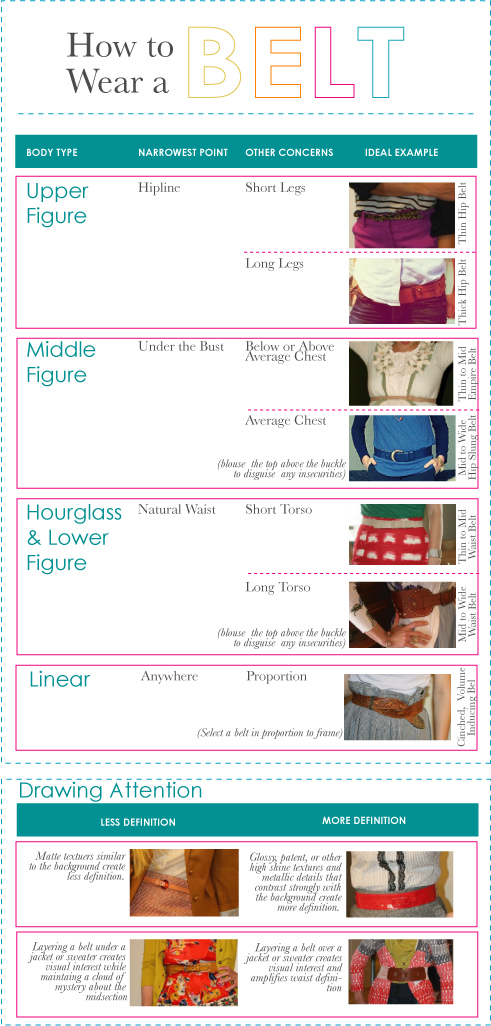2) Defining your silhouette both horizontally and vertically
| Body Type |
Narrowest Point |
Other Concerns | Ideal Example |
|
|---|---|---|---|---|
| Upper Figure | Hipline | Short Legs | Thin Hip Belt |  |
| Long Legs | Wide Hip Belt |  |
||
| Middle Figure | Under the Bust | Average Chest Size | Thin to Mid-Width Empire Belt |
 |
| Below or Above Average Chest | Mid to Wide Hip Slung Belt (blouse the top above the buckle to disguise any insecurities) |
 |
||
| Hour- glass/ Lower |
Natural Waist | Short Torso | Thin to Mid-Width Waist Belt |
 |
| Long Torso | Mid to Wide Width Waist Belt |
 |
||
| Linear | Anywhere | Select a Belt in Proportion to Frame | Cinched, Volume Inducing Belt |  |
Add either give or take to your belt with a Notch Puncher or streamline the loose belt tail with something more permanent than double sided tape, a Belt Loopy.
First consider proportions when selecting a belt. If you want something to appear shorter, divide it with a wider belt, alternatively a thinner belt will maintain visual length. Also be sure that your belt mirrors your frame, sturdy frames should avoid overly dainty belts. And delicate frames should stray from thick corsets.
Next not all belts are cut to the same straight line. A belt that is contoured or cut on the curve (smiling when laid down) will have an automatic narrowing effect. If you love the look of thick belts but fear their truncating effects, try a riding belt that narrows in at the center.
Finally, account for fibers. Thick elastic materials can offer comfort and can even girdle soft centers. Robust leathers will secure thick woolen wears or contrast more delicate gossamers. If you are insecure about your personal details being squished above or below a belt when you sit, favor structured woven materials over stretchy knits for the layer under your belt.
Lastly, avoid the most deadly of belt sins and never over constrict. If in doubt, move it back a notch. You don’t want abdominal details squishing out above or below your belt line.
downloadable cheat sheet







